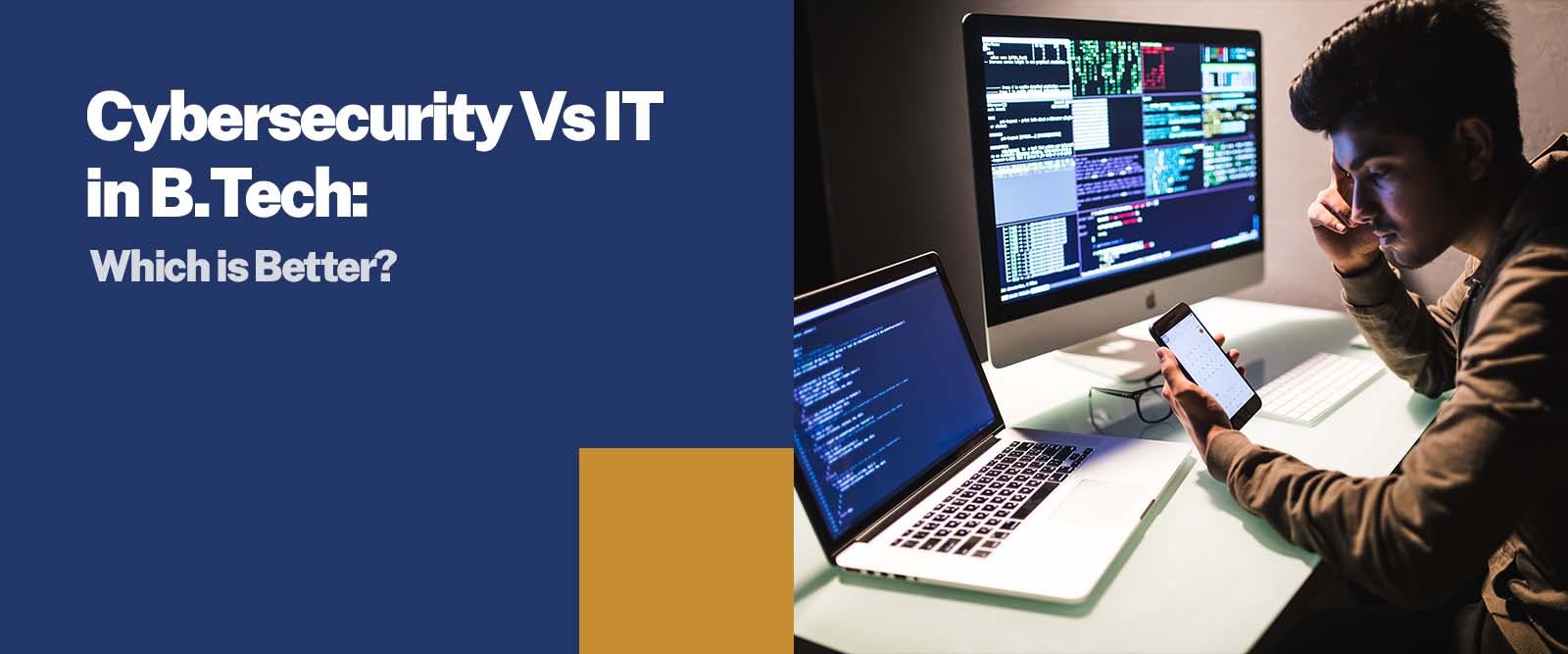5800 students unlocked their dream jobs with UG/PG programs in top colleges. Apply Now!
As the world becomes more digital, the need for skilled professionals in cybersecurity and information technology (IT) has grown exponentially. With so many exciting and lucrative career opportunities in both fields, it can be challenging to decide which path to pursue. While both degree programs share some similarities, there are significant differences between the two. Though one similarity that falls between the two is pursuing a Bachelor’s of Technology or B.Tech course in either of the field as per your interest.
In this blog, we'll explore the differences between a Bachelor of Technology B.Tech in Cybersecurity vs IT and help you determine which degree program is right for you.
What is B.Tech in Cybersecurity?
- B.Tech in Cybersecurity is a four-year undergraduate program that focuses on imparting knowledge and skills related to securing computer systems and networks from various types of cyber threats.
- The program covers topics such as information security, network security, web security, cryptography, ethical hacking, cyber laws, and incident response.
- For students to apply for this program must have cleared their 12th standard with a minimum of 55% marks majoring in Maths, Physics, and Chemistry. Having computer science as an additional subject will be helpful.
- Admissions in colleges for this course is done either on the basis of merit or on the scores students achieved in the national level entrance examination such as JEE Mains, BITSAT or EAMCET.
- With the increasing dependency of businesses and individuals on digital technologies, the demand for cybersecurity professionals is only going to rise in the future.
What is B.Tech in Information Technology?
- B.Tech in Information Technology is a four-year undergraduate degree program that focuses on the application of information technology in various fields.
- The program covers topics such as computer programming, software development, database management, networking, web development, mobile application development, and project management.
- Students must have completed their 12th standard with subjects Maths, Physics, Chemistry and Computer Science with a minimum of 50% marks.
- Admissions in colleges can be both merit-based and on marks scored in national entrance exams such as JEE Mains.
- The future scope of B.Tech in Information Technology is also very promising, as businesses and organisations are becoming increasingly reliant on technology to operate and grow.
Difference between B.Tech IT and B.Tech Cybersecurity
|
Factors |
B.Tech in IT |
B.Tech in Cybersecurity |
|
Average Fees |
₹30K - ₹8LPA |
₹1- ₹2.5 LPA |
|
Job Positions |
|
|
|
Top Recruiters |
|
|
|
Skills |
|
|
|
Average Salary |
₹4-5 LPA |
₹8 LPA |
B.Tech in Cybersecurity or B.Tech in IT- Which is Better?
B.Tech in Cybersecurity is focused on securing digital assets, preventing cyber attacks, and mitigating the risk of data breaches, a B.Tech in IT is focused on the development and management of information systems.
Ultimately, the decision to pursue a degree in Cybersecurity or IT will depend on your individual interests, strengths, and career aspirations. If you enjoy problem-solving and are interested in the security of digital systems and networks, a B.Tech in Cybersecurity may be the right choice for you. On the other hand, if you have a passion for developing and managing information systems, a B.Tech in IT may be a better fit. Regardless of which degree program you choose, it's important to stay up-to-date with the latest industry trends and technologies, as the technology industry is constantly evolving.
Conclusion
Both a B.Tech in Cybersecurity and a B.Tech in IT offer exciting and rewarding career opportunities. The key is to carefully evaluate your interests and career goals to determine which path is right for you. With dedication and hard work, you can build a successful and fulfilling career in the dynamic and ever-changing world of technology.
With Sunstone, you can get the chance to unlock numerous benefits which include 70+ training sessions from expert guest faculty (ex-IIMs, IITs). Along with this, students can get hands-on experience from capstone projects, which can be helpful in securing job offers.
HELP
Take the first step towards your dream job.
ABOUT THE AUTHOR

